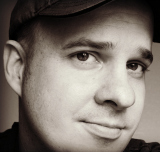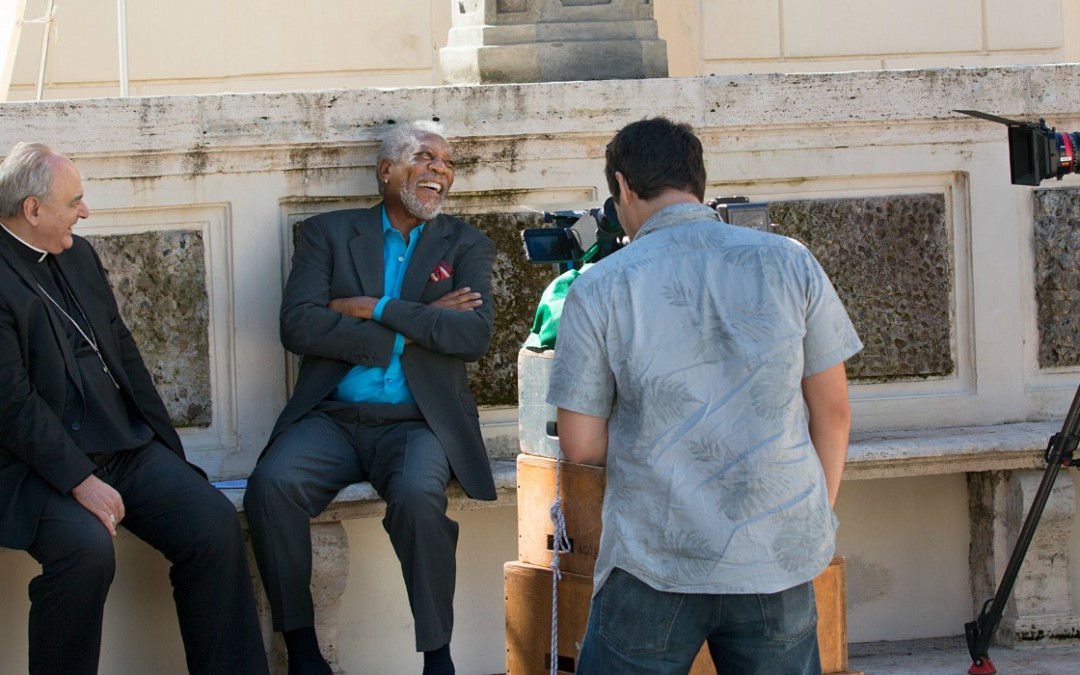 The National Geographic Channel’s new mini-series, called The Story of God, starring actor Morgan Freeman
The National Geographic Channel’s new mini-series, called The Story of God, starring actor Morgan Freeman, premiers Sunday, April 3, 9/8c.
The mini-series tackles one major God-related topic per episode–i.e. exploring one question per episode, such as “What happens after we die?” or “Who is God?”–the big questions.
Morgan Freeman has a genuine hunger for these big questions (as you’ll see in the trailer above). He and the crew who traveled with him, including producer James Younger, wanted to dive headfirst into the various religions found on earth (including Christianity) and try to put themselves in the shoes of other people. I had the chance to speak with James about the mini-series, and we had an interesting chat about Jesus and what “The Story of God” is aiming for in its globetrotting exploration of religion.
[And, as a side note, if Mr. Freeman or Mr. Younger ever get back on the road to explore more religious experiences–whether for personal or professional reasons–I’d like to extend an open invitation to either one of them to attend a specific event with me. I’ll explain more after I share my interview with James, but, oddly enough, the whole thing involves a conversation I had once with Dolly Parton about miracles.]
I have to say, “The Story of God” is interesting timing because there has been a spike in God talk in our culture lately.
Jennifer Garner’s Miracles from Heaven
recently came out, for example–a very powerful portrayal of faith. Even when I go out in public, it seems like more and more people have God on their minds and in their casual conversations. Even the latest superhero movie, “Batman v Superman,” spends a giant chunk of its script talking about God and the classic theological question known as the problem of pain. It was a fascinating experience to write a DC Comics movie review and simultaneously explore that theological question.
[Another side note: you can read my answer to that question in my Timothy Keller-inspired essay How Could a Good God Allow Suffering?. And speaking of Dr. Keller, who is the pastor of a church in the heart of New York City, I strongly recommend him. His sermons, which you can find here, are some of the most articulate considerations of religion I’ve ever heard.]
And now the “God talk” continues in my intriguing chat with an intriguing person–producer James Younger:
You have a very fascinating background. I was very interested to read how you have a PhD in biophysics and you wrote for The Economist, and now you’re producing documentaries. All of that made me very curious: what attracted you to doing ‘The Story of God?’
Well, I am a curious minded person I would say. I always wanted to know how things work, or why things work, why people believe or think what they do. I came at this initially … with these questions initially from a scientific view point. Why are we here? I remember thinking about the Big Bang when I was a kid. What was there before? How did that even happen? My goodness, how do we even exist? For a long time earlier in life, I think I made the mistake of seeing science and faith in opposition to one another. Then as I matured, I realized that they were different aspects, different ways of asking the same questions. That science is a quest for knowledge and understanding of things beyond us, and so is faith. Faith is a way of trying to wrap our hands around the big puzzle of existence. So that’s how I came to it.
What were some of your most memorable experiences while you were working on it?
We traveled so much to different countries. We went to India, Egypt, Rome, Turkey, Guatemala, and all across the US and saw some really powerful religious rituals and ceremonies. I remember being in a Buddhist ceremony in Northern India where there were hundreds of monks chanting this mantra in these really deep bass tones, and the whole room was shaking. There were these big trumpets blasting. It just feels like going to another space. Another dimension. You’re transported out of reality. By the banks of the Ganges, people every night do a big ritual where they give thanks for life, and they give thanks for the River Ganges for bringing them life. They light thousands of little candles and float them up onto the river. That was a great experience.
Then also–there were a couple more, if you want–there was a Navajo coming-of-age ceremony for a young girl, called a Kinaalda where a girl goes from girlhood to womanhood. The ceremony lasted four days where she actually becomes–the Navajo believe that the gods, the holy people inhabit the landscape, and if you are in the right frame of mind during those rituals, you can reconnect with those spirits. This girl, for a brief morning, she is kind of co-existing with a divine ancestor, the first Navajo girl. That was just remarkable, to see her get up and hunt at sunrise on this morning, and go sprinting across the landscape with her family following behind her, seeing how much she was powered by belief and faith. That was great.
This one last thing. I was at this Joel Osteen mega-church in Houston, and to see the ten thousand people worshiping and singing, and all of them having this very deeply personal connection with God. That was a really powerful experience.
Those images almost felt like a cinematic experience unfolding in the mind. It’s interesting to hear about that. And you mentioned Joel Osteen. I write for a Christian website, and so I wanted to ask about that specific angle. Jesus made the shocking claim that He was God, which was fairly shocking–that the Creator had come down to earth and become one of His own creatures. Jesus’ emphasis was not humanity searching for God, but God coming down to search for humanity. How does this documentary approach such a controversial figure as Jesus, who made such bold claims?
Jesus was revolutionary in many ways. We talk about how Jesus … the death of Jesus really changes people’s perceptions of life after death, and with a really new concept. I think a lot of people … a lot of faiths before Christianity had thought about how the dead are connected to the living. You know, how the ancient … the Aztecs in the 1300s and before believed that when people were sacrificed, their death powered the world. The ancient Egyptians, the Pharaoh, the dead Pharaoh, his spirit in the afterlife actually kept the sun moving and rising every day. So for a long time people had this idea that something about the dead … there was power in the dead that could change the world.
I think Jesus was a really new take on that. Here, death that could not just change people’s lives, but also give everybody the opportunity for eternal life.
The point of this series is not to study any one religion in specific. I wanted to see how they were all connected to one another. So when we looked at Jesus’ death, in that case, we looked at how they were connected to other ideas and how important … what was it that the dead have … that survived after death that was somehow some energy that we weren’t aware of in our day-to-day life.
The idea of Jesus being a person … We looked at that in the sense that … how has our idea of God changed over the millennia, over different cultures. We did discuss … we have an episode called “Who is Go
d?” that looks at how we go from many gods to one God, and how this idea happened in multiple places around the world. And how this idea of God as a person was maybe also a reaction to the gods that were so rarefied and distant, and maybe it was hard to connect to them for some people. So we looked at him through that context.
Does ‘The Story of God’ attempt to arrive at any final conclusions, or is it more about getting people to ask good questions?
Certainly we are not going to answer “what happens when you die?” We are not going to answer “who is God?” We’re not going to answer “why is there good and evil?” But we want people to think about those questions. And I think the answers that we provide lets us try to show you, as we learn ourselves, what different faiths of the world think. I think one thing that is pretty clear to me is that most people know almost nothing about other faiths. They know what Buddhists look like. They know what Muslims look like. They know what Hindus do in their rituals. But do they know how they think? Do they know how they see the world, and their place in the world, and who God is to them? And so we can provide some answers about that. We can tell people … we can show people a little bit more about different faith traditions. We’re hoping to show people that their different faiths are not as different … they’re not polar opposites. They’re actually united in many ways that are not apparent until you know that faith.
I think [the attempt to examine these deeper issues in life is] definitely a much-needed thing because our culture tends to be obsessed with the more of the material … you know, what am I going to buy? What am I going to wear? What am I going to eat for dinner? I’m glad that there are things like this that are getting people to think more about these deeper questions.
We certainly hope so. We think it’s necessary too, especially now in the times we live in with a lot of religious conflict, that this idea of learning more about other faith traditions can only help.
***
The Story of God premiers on National Geographic Channel on Sunday, April 3, 9/8c.
[As a follow-up to the comment above: I’d like to extend an open invitation to Morgan Freeman or James Younger or any of the NatGeo staff to attend a Monday night prayer meeting with me at my church sometime. In “The Story of God,” the film team visited Joel Osteen’s mega-church in Houston. This prayer meeting, in its size and scope, is the polar opposite. It’s a small church (more of a nano-church, I suppose, compared to a mega-church) in California that does not have any full-time paid staff. The pastor works full-time in another job as a psychologist for the county, and most everyone in the church’s staff are volunteers. We usually have around 10-15 people who come to this meeting, sometimes less. A worship band leads a couple songs, and then we just pray together about difficult situations in the world or pray for each other for 20-30 minutes. I’ve been to mega-churches, and they’re great, but this humble little meeting can be just as powerful and transformative, which always surprises me. I’ve seen some amazing things happen. I’ve even experienced a very dramatic miracle firsthand. In fact, I once chatted with Dolly Parton about it, weirdly enough. She grew up in a similar church. You can read about the miracle in detail here in my interview with Dolly.]


